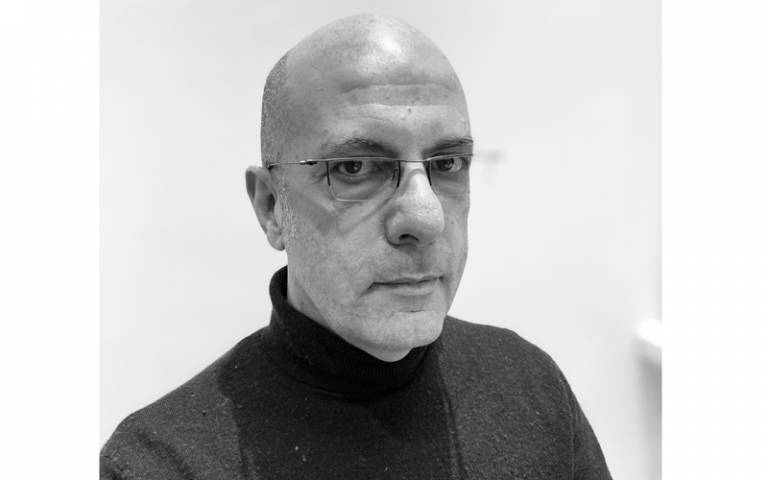Spotlight on... Professor Haim Yacobi
24 March 2022
This week, Haim talks to us about his work looking at health outcomes in divided cities, the importance of creating a sense of community among students, and his long-standing morning routine.

What is your role and what does it involve?
I am a Professor of Development Planning at the Bartlett Development Planning Unit (DPU), leading our MSc Health in Urban Development. In this role I teach a core module “Health, Social Justice and the City” that introduces key approaches, theories and ideas for the study of urban health. Additionally, I also lead our practice module focusing on how urban conflicts and spatial division have driven significant changes in the production and use of urban spaces and population health in cities where ongoing conflict (often violence) occurs. In the last two years we have worked in Nicosia, exploring how the division of the city affects the health of communities, and this coming year we will work in Belfast, in partnership with Belfast Healthy City. We will explore different urban health challenges such as children's health in post-conflict cities, care zones development, car dependency and health as well as the effect of leaded water on different communities in Belfast.
I see our practice module as a unique opportunity for students to integrate their academic knowledge into practice, and hence there is a strong emphasis on “real-life” urban health problems, the development of effective health intervention in urban scale including policies, planning, development etc. As a Programme Leader – especially during the pandemic – it is also important for me to develop a strong sense of community among our students – many of them are from overseas and come from diverse geographies and cultures. Hence, both academically and socially I invite the students to bring to the class their own experience, identity, academic discipline and knowledge which serve as basis for our collective learning.
How long have you been at UCL and what was your previous role?
I have joined UCL almost five years ago – but this was also a “return” to the DPU, where I graduated in 1997.
Joining UCL was exciting, following two decades of extensive academic work that included a one-year Fulbright post-doctorate at the University of Berkley California, and later two years as a Marie-Curie Fellow at the department of Architecture at Cambridge University. My academic position in Israel was at the Department of Politics and Government at Ben Gurion University where I have also served as a Head of Department.
What working achievement or initiative are you most proud of?
Academically, I am proud of one of my recent projects which was supported by the Wellcome Trust and The Bartlett Synergy Grant: Gaza: the spatio-politics of health, death and life, which studies how power, violence and health become entangled in conflict zones and what kind of resilience strategies are developed by individuals and communities. The importance of this project led me and my colleague, Michelle Pace from Roskilde University to publish not just an academic article, but also a blog, Gaza: Cage Politics, Violence and Health, a podcast, #3 Gaza: from ghetto to frontier, and a short documentary, Gaza: Arts of Resilience and Hope in the Midst of Despair which are all open access for the public.
An additional project I am proud of is my initiative, 20 years ago, to establish an NGO called BIMKOM – Planners for Planning Rights, and works to strengthen democracy and human rights in the field of planning in Israel\Palestine. Within this framework I was involved in many consultancy projects dealing with the right to health and planning within the unrecognized Bedouin settlements, and participatory planning with Palestinian communities in East Jerusalem. I am proud that BIMKOM has become one of the central organisations dealing with minority rights (both Jewish and Palestinian) and the planning apparatus in Israel.
Tell us about a project you are working on now which is top of your to-do list?
Together with Professor Ed Fottrell (UCL Institute for Global Health) we received the UCL Social Science Plus Grant: Overcoming Syndemic Urbanism: Health, Vulnerability and Communities’ Resilience. The project aims to conceptually develop the notion of Syndemic Urbanism as both theoretical and methodological lenses through which urban health and interventions should be understood. Syndemic urbanism focuses on how urban-spatial elements influence the accumulation of several health conditions and how these are experienced in an urban context. The research is planned as a pilot in Faridpur, a major city located in the Faridpur District, Bangladesh with local partners investigating how urban-spatial elements affect syndemic urbanism, and how might they be used as a vehicle for informing interventions leading to urban health justice. This project will also refer to the ways in which communities (local) knowledge, participation and leadership can contribute to the improvement of urban health.
What is your favourite album, film and novel?
My favourite album is Avishai Cohen’s Aurora (2009) – an excellent piece combining jazz and ethno-music, and a wonderful multi-language vocality which is based on rich and diverse historical sources. My very favourite novel is Elena Ferrante’s My Brilliant Friend (I have read the Hebrew translation from Italian) which is a wonderful opportunity to follow (among other things) the urban life of a poor yet vibrant neighbourhood life of Naples. One of my favourite films is the French film La Haine (Hate), written and directed by Mathieu Kassovitz. Though it is a relatively old film (1995) it exposes the viewer to some of the most current urban challenges such as migration, race, marginalisation and urban violence.
What advice would you give your younger self?
Stick to your aspiration and never(!) give up.
What would it surprise people to know about you?
I wake up early each morning and practice Iyengar yoga!
What is your favourite place?
No doubts – Paris.
 Close
Close

